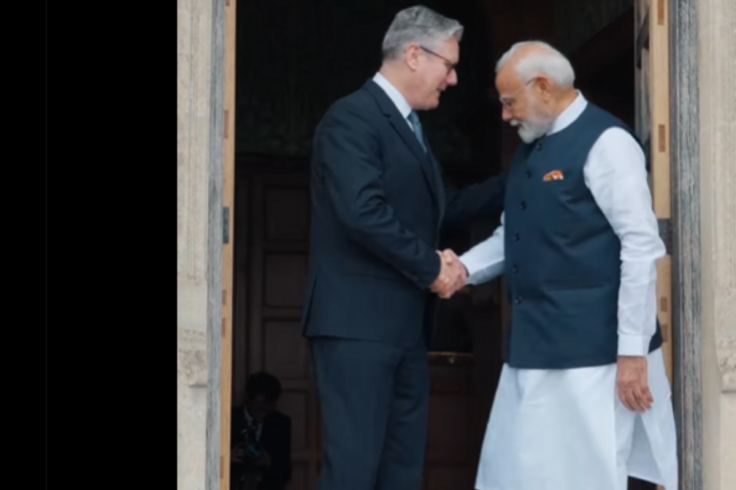Inside The Starmer-Modi Mumbai Fintech Summit And Why Some Are Saying It Is Set To 'Transform' Tech

Prime Ministers Keir Starmer and Narendra Modi will converge at the Global Fintech Fest 2025 in Mumbai on 9 October 2025, igniting hopes for a UK-India tech revolution amid soaring bilateral trade ambitions.
This landmark summit, themed 'Empowering finance for a better world powered by AI', draws over 100,000 attendees, 7,500 companies, and 1,000 speakers to showcase innovations like UPI's 20 billion monthly transactions.
As the duo spotlights quantum computing and AI-driven finance, experts hail it as a 'transformative' pivot, potentially unlocking £25.5 billion ($39.1 billion) in annual trade gains from their July free trade agreement.
Unveiling the Global Fintech Fest Agenda in Mumbai
The Global Fintech Fest 2025 kicks off on 7 October 2025 at Mumbai's Jio World Centre, uniting policymakers, bankers, and innovators under the banner of AI-powered financial inclusion. Day one spotlights regulatory sandboxes and cross-border payments, with sessions on how platforms like UPI and Account Aggregator have processed 2.84 lakh daily consents in early 2025, democratising access for millions as noted in a X Post.
TLDR, the third edition of the Blume Fintech Summit is open for registrations, reserve your spot today!
— Blume Ventures (@BlumeVentures) October 3, 2025
The Blume Fintech Summit returns for its third edition in partnership with Stripe and Google. This exclusive gathering comes at a pivotal moment - India now ranks third… pic.twitter.com/FYTv8IPFGy
On 8 October 2025, panels dissect health finance and AI ethics, featuring 500 investors eyeing India's £70 million ($107 million) fintech funding surge in the first half of 2025 alone. The climax arrives on 9 October 2025, as Modi and Starmer deliver keynotes, emphasising 'platform for all, progress for all' in digital ecosystems.
This event builds on India's fintech prowess, where ONDC and DigiLockerempower street vendors alongside executives, fostering equitable growth as highlighted by @BJP4India. Attendees praise the summit's scale – 1,000 speakers tackling cyber resilience and green finance – as a catalyst for global standards.
In today's world, the fintech sector has become a prominent topic of discussion. One of its most remarkable contributions is its role in fostering inclusive development. India has developed innovative platforms that cater to everyone, ensuring equitable access to financial and… pic.twitter.com/878d4u86Mm
— BJP (@BJP4India) September 25, 2025
Organisers highlight Maharashtra's role, with Modi inaugurating metro expansions symbolising infrastructure-tech synergy. For everyday Indians, these discussions promise faster remittances and smarter lending, bridging urban-rural divides through verifiable tech pilots.
Starmer and Modi's Push for UK-India Tech Partnerships
Keir Starmer's inaugural India visit as prime minister, alongside Narendra Modi at the summit, spotlights the freshly inked UK-India free trade agreement from 24 July 2025, projected to create thousands of British jobs via £6 billion ($9.2 billion) in investments and exports.
Their bilateral huddle on 9 October 2025 prioritises the India-UK Technology Security Initiative, signed in 2024, now accelerating quantum computing collaborations between Imperial College London and Indian institutes. Starmer champions defence-tech synergies, while Modi underscores AI's role in inclusive finance, echoing his vision of technology as India's 'greatest equaliser'.
This pact, boosting annual trade by £25.5 billion ($39.1 billion), eases tariffs on whisky and gems, fuelling fintech flows. In a X post from @suhasinih , the Diplomatic Affairs Editor at The Hindu states: 'Excl: British PM Keir Starmer likely to visit India October 7-9 to attend Mumbai Fintech Summit, meet PM Modi.' Discussions extend to licensing reforms and data sovereignty, aiming to harmonise regulations for seamless cross-border innovation.
Excl: British PM Keir Starmer likely to visit India October 7-9 to attend Mumbai Fintech Summit, meet PM Modi. @slakster reportshttps://t.co/4b5KiZXNu5
— Suhasini Haidar (@suhasinih) September 23, 2025
For professionals, this means expanded opportunities in AI ethics and blockchain, with UK firms eyeing India's 1.4 billion-strong market. The leaders' rapport, built on Modi's recent UK trip, signals a post-Brexit pivot towards Asia, where tech diplomacy drives mutual prosperity.
Why the Summit Promises to 'Transform' Global Tech Landscapes
Analysts buzz that the Starmer-Modi Mumbai rendezvous could galvanize fintech by embedding AI safeguards into international norms, countering risks while amplifying India's UPI model worldwide.
Critics note the FTA's £25.5 billion ($39.1 billion) trade uplift may reverse India's surplus by 2040, yet proponents argue it fosters innovation hubs, supporting 600,000 jobs across both economies through enhanced investments. For citizens, transformative impacts include affordable health fintech via AI diagnostics, reaching underserved villages.
The summit's investor influx – over 500 funds – signals a £10 billion ($15.3 billion) pipeline for startups by year-end. As Modi quips, 'technology has become India's greatest equaliser', this platform could redefine global equity, blending UK's regulatory finesse with India's scale for a 'better world'.
Ultimately, it heralds a new era where fintech bridges divides, powering sustainable growth.
© Copyright IBTimes 2025. All rights reserved.





















